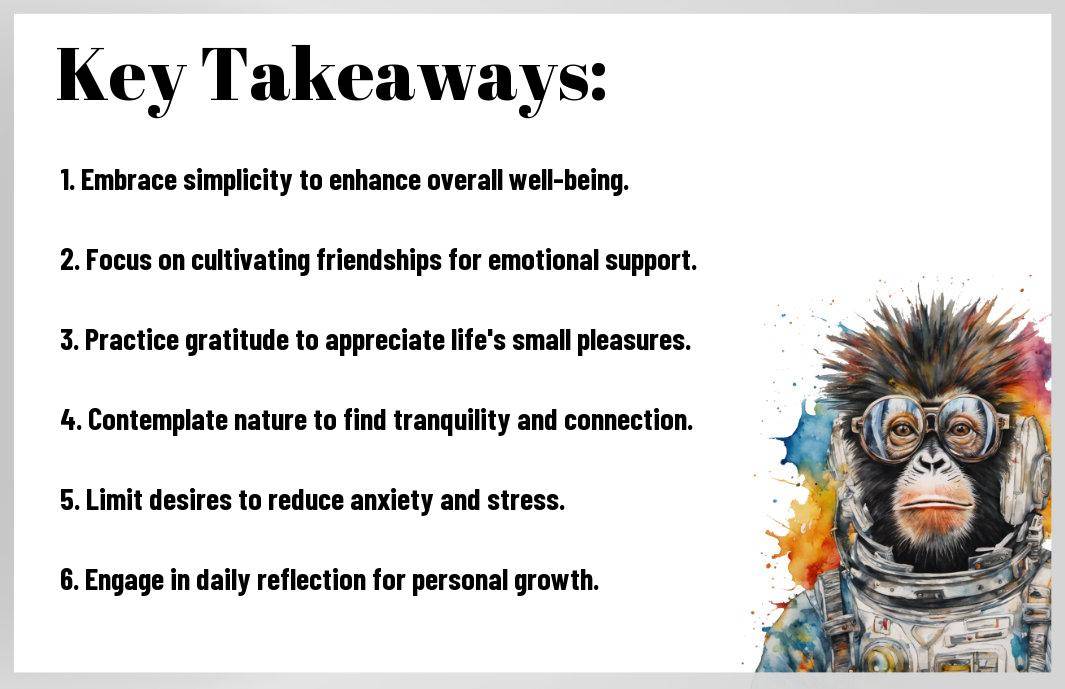
Newsletter Subscribe
Enter your email address below and subscribe to our newsletter

Enter your email address below and subscribe to our newsletter

Epicurus believed in finding joy and tranquility through simple pleasures and inner peace. In my journey to achieve that calm, I’ve explored the meditative practices that resonate with his philosophies. By embracing mindfulness, I’ve learned how to let go of anxiety and focus on the present moment. Join me as I share how you can incorporate Epicurean meditation into your life for a deeply fulfilling sense of serenity and joy.

While many of us have heard of Epicurus, few truly understand the essence of his teachings. Epicurus was a philosopher from ancient Greece who founded a school of thought centered on achieving happiness through the pursuit of pleasure and the avoidance of pain. His philosophy emphasizes the importance of simple pleasures, friendship, and the cultivation of inner tranquility. In a world that often prioritizes material success and external validation, Epicurus’s teachings offer a refreshing perspective that can guide us toward finding our own inner calm.
Below, I’d like to share a brief overview of the life and influence of Epicurus. Born on the island of Samos around 341 BC, Epicurus established a community known as “The Garden,” where he welcomed followers from all walks of life. His teachings provided a counterpoint to the popular philosophies of his day, advocating for a calm and thoughtful approach to life, rather than one driven by fear or desire. Epicurus’s writings, though limited in number, had a profound impact on later thinkers and are still relevant in our search for meaning and contentment today.
One of the central tenets of Epicurus’s philosophy is the idea that true happiness can be found in the simple pleasures of life. He believed that by focusing on what genuinely brings joy—such as companionship, nature, and thoughtful reflection—you can cultivate a sense of peace that transcends external circumstances. Epicurus also emphasized the importance of minimizing desires and seeking contentment with what we already have. Through this lens, I find that meditation becomes a powerful tool for embracing simplicity and fostering a deeper connection with my inner self.
Understanding Epicurus’s key philosophies helps me see how I can apply his wisdom in my daily life. By cultivating an awareness of simple joys and embracing mindfulness practices, I can create space for serenity in a chaotic world. Meditation, in this sense, becomes a means to align with Epicurus’s ideas of pleasure and tranquility, helping me to navigate life’s challenges with a more balanced and peaceful mindset.

One of the biggest misconceptions I often encounter about meditation is that it requires a specific technique or complex practices. In reality, it’s more about creating a space for yourself to reflect, breathe, and just be. This inner pause allows us to connect with our thoughts and feelings, fostering a kind of mental clarity and calmness that can help us navigate the stresses of daily life. It’s a simple practice, yet one that can yield profound results over time.
An imperative aspect of meditation is its versatility. It can take many forms, from guided sessions led by calming voices to silent personal reflections. What unites all these practices is the aim to cultivate mindfulness and focus. When I meditate, I often find that it helps me to tune into the present moment, letting go of distractions and worries, if only for a short while. This intentional focus allows me to deepen my awareness, not just of my surroundings but also of my inner landscape.
Before diving deeper into how meditation can transform your life, let’s explore its benefits. Practicing meditation regularly can lead to reduced stress, improved concentration, and even better emotional regulation. I’ve discovered that it offers a unique opportunity to manage both physical and mental health by encouraging relaxation and a clear mind. It’s remarkable how even ten minutes of meditation can shift my perspective and contribute to a greater sense of well-being.
With each session, you may find that the tranquility you cultivate expands beyond your time on the cushion, deeply influencing your daily interactions and decision-making. I personally have felt more grounded and resilient in tough situations after a good meditation session. The calmness it brings serves as a solid foundation from which I can face the world, making it a powerful tool for enhancing overall quality of life.
Not many of us realize how often we get caught up in our thoughts, drifting away from the beauty of the present moment. Yet, Epicurus emphasized the importance of being engaged in life as it unfolds before us. For me, practicing mindfulness has become a delightful journey toward discovering a sense of inner calm. When I allow myself to appreciate the now, I find it’s easier to let go of stress and worries that tend to cloud my mind.
Presence is an incredible state of being that allows me to truly experience life. By focusing on the sensations I feel, the sounds I hear, and the sights around me, I immerse myself in the beauty of the moment. Whether I’m sipping a hot cup of tea or taking a walk in nature, I try to bring my full attention to the experience. This practice has made me realize how rich each moment can be when I let go of distractions and embrace the here and now.
The journey towards mindfulness is filled with practical techniques that can transform how you perceive daily life. I have found that simple practices like deep breathing, guided meditations, or even mindful eating can make a significant difference. Taking a few moments to focus solely on my breath or my food helps me grow more aware of my surroundings and enriches my experiences. Journaling can also encourage reflection on what I am grateful for in the present, deepening my connection to the moment.
And incorporating mindfulness into your routine doesn’t need to be overwhelming. You can start small by designating just a few minutes each day to pause and observe your thoughts without judgment. Over time, you’ll find that these moments of stillness become invaluable as you cultivate a greater awareness of yourself and the world around you. Embrace these techniques, and you’ll be surprised how they enhance your overall sense of well-being and presence.
Now, the philosophy of Epicurus invites me to explore the profound benefits of nature and simplicity in my daily life. In a world bustling with distractions, his teachings resonate more than ever, encouraging me to seek solace in the lush greenery around me and to appreciate the gentle rhythms of the natural world. By immersing myself in the serene atmosphere of parks, forests, or even my garden, I find that my thoughts become clearer, and my mind experiences a much-needed respite from everyday stresses. This connection with nature not only calms my spirit but also heightens my awareness of the simple pleasures that life offers.
With every step I take outdoors, I can feel a revitalizing energy coursing through me. Whether I’m watching the leaves dance in the breeze or listening to the melodic chirping of birds, these little moments remind me of the beauty that exists beyond the chaos of daily life. Spending time in nature allows me to detach from my electronic devices and immerse myself in the present, fostering a sense of gratitude for the wonder surrounding me. All it takes is a mindful walk or a few moments of stillness outdoors for me to reconnect with my inner calm, grounding my thoughts in the natural world.
Beside appreciating nature, I find that embracing a simpler lifestyle significantly contributes to my inner peace. By decluttering not just my physical space but also my mind and schedules, I can focus on the necessarys that truly bring joy and contentment. Prioritizing quality time with loved ones, engaging in mindfulness practices, and letting go of unnecessary commitments clear the way for a more fulfilling existence. When I strip away the excess and center my life around meaningful experiences, I create an environment where my thoughts can flourish, and my spirit can thrive.
Even small changes in my daily routine can lead to a more simplified life. By adopting practices like minimalism or mindful consumption, I find greater satisfaction in what I already have rather than constantly pursuing more. This approach not only alleviates stress but also allows me to focus on what truly matters, be it nurturing relationships, indulging in hobbies, or simply enjoying quiet moments of reflection. In doing so, I discover that inner calm is much more attainable when I simplify my lifestyle, aligning it more closely with the teachings of Epicurus.

Once again, I find myself reflecting on the profound impact that friendship has on our quest for inner calm. Epicurus emphasized the importance of companionship, believing that our relationships with others contribute significantly to our happiness and tranquility. It makes sense: when we have a supportive network, life’s challenges seem a bit less daunting, and the joy we experience is magnified. Cultivating such relationships offers us not just comfort in times of distress, but also a deeper connection to the world around us—a vital ingredient for achieving inner peace.
One of the most rewarding aspects of my life has been the time invested in building meaningful relationships. These friendships are not just casual acquaintances; they are bonds forged through shared experiences, vulnerable conversations, and mutual support. When you surround yourself with those who share your values and passions, it enriches your life in ways one can hardly imagine. I find that these deeper connections allow me to share my thoughts without fear of judgment, creating a safe space where I can explore my emotions and thoughts more freely.
Around every corner of friendship lies the opportunity to share wisdom. When I converse with friends, I not only express my viewpoints but also gain fresh perspectives that challenge and expand my understanding of the world. These interactions often lead to enlightening discussions about life, philosophy, and even the very essence of happiness—didn’t Epicurus have a lot to say about this? By discussing our insights, we foster an environment where both parties can grow and thrive, ultimately leading us to greater inner calm.
Further exploring the idea of sharing wisdom with friends, I’ve noted that these exchanges often bring about a deeper sense of fulfillment. Each conversation can act as a gentle reminder of the values we hold dear and encourage us to reflect on our own lives. By openly discussing our experiences, we create a reciprocal flow of ideas and knowledge that benefits both sides. This not only enhances our individual growth, but it also strengthens our relationships, allowing us to face life’s uncertainties with a collective resilience. The joy lies in knowing that I don’t have to navigate my journey alone—I have my friends to lean on, learn from, and share life with.
Many seekers of inner peace often find solace in the teachings of Epicurus, which emphasize the importance of simple pleasures and a mindful approach to life. To cultivate a meditative lifestyle, I’ve discovered that incorporating daily practices into my routine enhances my journey toward tranquility. By prioritizing moments of reflection, I can create an authentic connection to the present, allowing me to embrace each day with joy and calmness.
The establishment of a consistent routine is vital for integrating meditation into your daily life. I suggest starting small; perhaps dedicating just five minutes each morning to sit in silence, focus on your breath, and set an intention for the day ahead. Gradually, as this practice becomes a natural part of your day, you can extend the time or explore different modes of meditation, such as guided sessions or gratitude journaling.
Before delving into the various techniques of meditation, it’s vital to cultivate consistency in your practice. One way I’ve found effective is to schedule my meditation time just like any other appointment. By selecting a specific time each day—whether in the morning, during lunch, or before bed—meditation transforms into a non-negotiable part of my routine. Keeping the environment serene and familiar also helps reinforce this habit.
This approach has helped me navigate interruptions and challenges while remaining dedicated to my practice.
In fact, staying committed to your meditation journey doesn’t have to be a struggle. I embrace the idea that each moment spent in meditation is an opportunity for growth. By celebrating small victories, you can make your practice feel rewarding rather than burdensome. Here are some additional tips to maintain that meditation habit:
This mindset shift can transform your experience into one filled with ease and natural joy.
From above, I have come to appreciate the wisdom of Epicurus when it comes to finding inner calm. By practicing simple meditative techniques that focus on contentment and the appreciation of life’s pleasures, I have discovered a more peaceful state of mind. You might find that by embracing these philosophies, your own journey toward tranquility will feel much more attainable. If you’re curious about how these practices can enhance your daily life, I encourage you to explore more about Epicurus’s approach. You can check out How Epicurus Keeps Calm 📽️ – Einzelgänger for inspiring insights.
As I continue to integrate Epicurean principles into my own life, I feel a shift toward a more serene and balanced existence. It’s exciting to think about the potential for all of us to cultivate our inner calm through such timeless wisdom. So, if you’re looking for a gentle reminder to slow down and savor the moment, I invite you to join me on this journey of quiet reflection and appreciation for what truly matters.
A: Epicurus believed in the pursuit of pleasure and the avoidance of pain as fundamental principles of happiness. His philosophy encourages mindfulness and introspection, which can be achieved through meditation. By focusing on the present moment and simplifying desires, individuals can cultivate inner calm and foster a deeper understanding of their own thoughts and feelings.
A: While modern meditation often emphasizes mindfulness and stress reduction, Epicurean meditation focuses on philosophical contemplation and the pursuit of tranquility through understanding and acceptance of one’s desires. It involves reflecting on one’s life, relationships, and personal goals, seeking to align them with a balanced lifestyle that minimizes suffering while maximizing joy.
A: Absolutely. Epicurean meditation is accessible to everyone, regardless of background or experience with meditation. It invites individuals to reflect on their lives, think critically about their desires, and create a personal philosophy that prioritizes inner peace. With practice, anyone can develop the skills needed to engage in this reflective form of meditation.
A: To meditate like Epicurus, start by finding a quiet space. Sit comfortably and take deep breaths to center yourself. Reflect on the simple pleasures in life, such as friendship, nature, and appreciation of beauty. Consider what brings you genuine happiness and what desires may lead to unnecessary anxiety. Journaling afterward can also help solidify your insights.
A: Yes, Epicurean meditation can serve as a powerful tool for self-improvement. It encourages individuals to evaluate their motivations and desires critically. By identifying what truly brings joy and what leads to dissatisfaction, people can create more harmonious lives, fostering deeper connections with themselves and others.
A: The duration of meditation can vary based on personal preference and schedule, but starting with 10-15 minutes daily is often recommended. Consistency is key; over time, even short sessions can yield significant benefits, enhancing your ability to maintain a peaceful inner state and promoting a deeper understanding of yourself.
A: Difficulty focusing is common, especially for beginners. If distractions arise, gently acknowledge them without judgment and guide your mind back to your reflections on pleasure and tranquility. You can also try using a mantra or a focal point to help maintain concentration. Building familiarity with the meditative process will improve your focus over time.